16/8 Intermittent Fasting – 8 Hour Diet For Fast Weight Loss
Losing weight without sacrificing your favorite foods has never been easier.
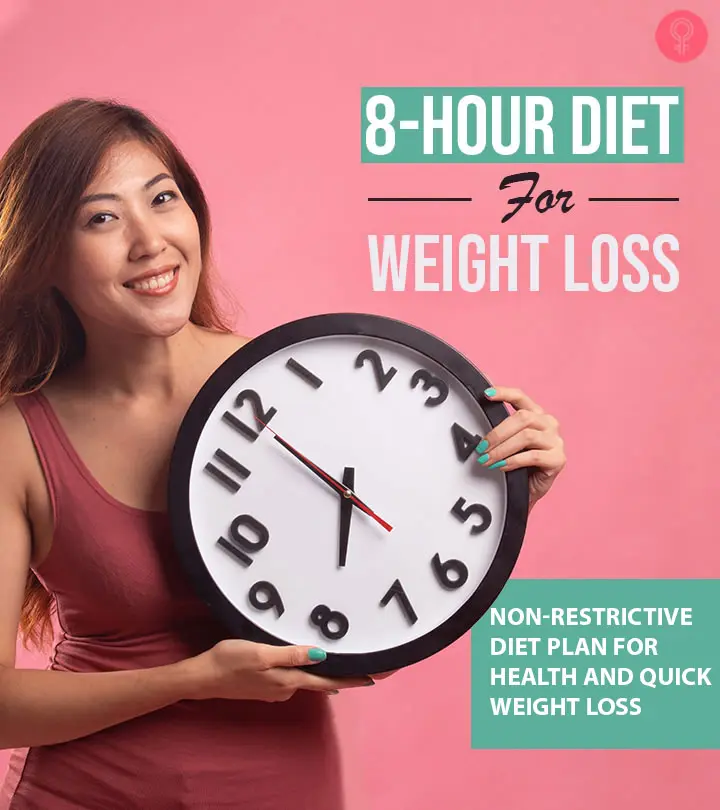
Image: StyleCraze
If you want to try intermittent fasting to lose weight, we can help. Try the 8-hour diet. Here, you will fast for 16 hours and feast for 8 hours. This intermittent fasting (IF) strategy aids in faster weight loss and body weight regulation than any other diet. Also known as the 16/8 diet or 16/8 intermittent fasting, research shows that the 8-hour diet reduces cholesterol and high blood pressure and improves insulin sensitivity (1). Read on to get all the details about the 8-hour diet, including the foods to eat and avoid and the 8-hour diet menu plan, and understand if this diet is for you.
 At A Glance: The 8-Hour Diet
At A Glance: The 8-Hour Diet- Principle: Time-restricted diet where you eat within an 8-hour window and fast for the remaining 16 hours
- Purpose: To make the body use its fat store for energy, improve metabolic health, and promote weight loss.
- Who It Is For: Individuals trying to lose weight, restrict mindless eating, and minimize the risk of metabolic diseases like type 2 diabetes.
- Duration: Long-term
- Who Should Avoid: Individuals with low blood sugar levels, women who are pregnant and breastfeeding, and people with type 1 diabetes who are on insulin.
- Cons: May lead to persistent hunger, nausea, mood swings, weakness, and fatigue.
In This Article
What Is The 8 Hour Diet?

The 8 hour diet follows a time-restricted eating plan that is highly effective for weight loss. And you don’t even have to compromise on your hunger or health. The 8 hour diet is a type of intermittent fasting (IF) where you can eat anything you want within the 8 hour window and fast for 16 hours. This diet was popularized by the authors, David Zinczenko and Peter Moore in the book, The 8 Hour Diet, and it is also known as 16/8 intermittent fasting.
A survey conducted on 1,241 US Americans found that 24% of the respondents had tried intermittent fasting. It was further noted that out of the 9 in 10 people who had tried this diet, 50% found it very effective and 37% found it somewhat effective for weight loss.
 Trivia
TriviaKey Takeaways
- A 16/8 intermittent fasting diet limits daily eating time to 8 hours, followed by 16 hours of fasting.
- This diet plan improves energy metabolism, uses up stored fat, and enhances insulin sensitivity.
- Beginners should start fasting on alternate days or twice a week.
- Plan the 8-hour eating window based on your lifestyle and activities.
- Stick to healthy food and steer clear of fats, oils, alcohol, aerated beverages, and artificial additives.
How Does The 8 Hour Diet Work?

The 8 hour diet works in the following ways:
- Stimulates The Function Of The Mitochondria – Mitochondria are cell organelles that convert glucose to usable energy (ATP). Fasting for 16 hours helps stimulate the mitochondria and reduces the level of intracellular damage caused by a poor diet (2), (3)
- Uses Up Glycogen And Fat Stores – Glucose is converted into glycogen and stored in your muscles and liver (glucose metabolism). In a fasted state, your body first uses up glycogen for fuel and then gains access to fat stores (4).
The 8 hour diet teaches you how to trigger the “furnace” in your body that burns fat while you sleep, so that the flab can get stripped away right from the moment you wake up, thereby optimizing your metabolic rate.
- Burns The Calories You Consume – According to David Zinczenko and Peter Moore, the authors of The 8 Hour Diet, modern lifestyles involve grazing or eating around the clock, which does not give your body sufficient time to burn all the calories that it is required to.
While you are fasting, your body gets the chance to reset itself and digest food. This allows your body to process nutrients and eliminates toxins effectively.
- Keeps You Satiated – Most diets are restrictive. From portion control to caloric restriction, there are various terms and conditions that the dieter needs to follow. The 8 hour diet takes the pressure off a traditional “diet”.
Having the freedom to eat everything within an 8 hour window keeps your taste buds alive and prevents boredom. That’s why it is sustainable.
Main Idea – The 8 hour diet stimulates your metabolism, burns the glycogen and fat stores, and gives your body enough time to digest food and eliminate toxins. It is a great weight loss strategy as it facilitates hunger management, better food choices, improved digestive health, and appetite control. It keeps your interest in the diet alive by allowing you to eat anything you want.
Considering all of that, is the 8 hour diet safe? Here’s what science says:
Is The 8 Hour Diet Safe?
Yes, the 8 hour diet is safe. In fact, fasting has various health benefits.
Research shows that people who fast intermittently shed fat without affecting their muscle mass. Their blood cholesterol levels improve, they become more insulin sensitive, and the risk of diabetes and metabolic diseases reduces leading to chronic disease prevention (5), (6), (7). An intermittent diet can help women with PCOS to improve their insulin resistance levels and is good for overall cardiometabolic health. However, you must follow the schedule as mentioned in the next section.
However, you must follow the schedule as mentioned in the next section.
8 Hour Diet Or 16/8 Intermittent Fasting Schedule

Follow the 8 hour diet every alternate day initially. Later, you can follow it every day or once every two days, depending on how long can you survive without food and also if you are losing weight and feeling good.
Design your schedule according to your lifestyle. Observe when you feel hungry the most (is it during breakfast or lunch?). How many hours do you work or are in school? Do you work out?
If your day starts at 8 am, you can eat from 8 am to 4 pm. Well, if that’s too early, use the 10 am – 6 pm window. Fast until 10 am the next day.
 Quick Tip
Quick TipNote: You may follow this diet every alternate day or just once or twice a week depending on your convenience and schedule.
Here’s a sample diet plan for the 8 hour diet or 16/8 intermittent fasting:
Sample 8 Hour Diet Plan
| Meal | What To Eat |
|---|---|
| When You Wake Up | Green tea or coffee or any detox drink |
| Breakfast (10 a.m.) | Options ● Wheat flakes and milk ● Banana smoothie or kale smoothie ● Scrambled or hard-boiled eggs with toast |
| Pre-Lunch Snack (11:30 a.m.) | Options ● Cucumber and watermelon salad ● 4 almonds |
| Lunch (12:30-1:00 p.m.) | Options ● Baked fish and veggies + low-fat yogurt ● Tortilla wrap+ low-fat yogurt ● Tuna/vegetable sandwich + fresh fruit juice |
| Post-Lunch Snack (2:30 p.m.) | Options ● 1 medium-sized dark chocolate brownie ● 1 orange or apple |
| Evening Snack (4:00 p.m.) | Options ● A small bowl of potato wafers ● A small bowl of popcorn ● A small bowl of nachos with low-fat mayonnaise dip |
| Dinner (6:00 p.m.) | Options ● Grilled vegetable/chicken kebab + bread pudding ● Asian-style chicken soup/Indian lentil soup+ fruit custard ● Vegetable lasagne + cucumber juice ● Kidney beans chili + 2-3 chapatis + glass of warm milk |
Apart from the foods mentioned in the chart, here’s a list of foods you may eat and avoid to lose weight.
16/8 Intermittent Fasting Foods To Eat

- Vegetables And Fruits – Any vegetable or fruit.
- Proteins – Beans, soy, tofu, lentils, eggs, fish, chicken breast, turkey, lean cuts of beef and pork, protein bars (limited amount), and protein shakes.
- Grains – Brown rice, black rice, white rice, broken wheat, wheat, barley, amaranth, quinoa, and sorghum.
- Dairy – Any dairy product (unless you are lactose intolerant).
- Fats And Oils – Olive oil, rice bran oil, canola oil, butter, ghee, mayonnaise, and margarine (all in limited amounts).
- Desserts – Chocolate pudding, bread pudding, banana muffins, cupcakes, homemade cakes, ice cream, custard, chocolate, etc. (all in limited amounts).
- Herbs And Spices – Any herb or spice, unless you are allergic to any of them.
- Beverages – Fresh fruit or vegetable juices, tender coconut water, detox drinks, green tea, black tea, and coffee.
16/8 Intermittent Fasting Foods To Avoid
- Fats And Oils – Lard, coconut oil, butter or mayonnaise in excess.
- Beverages – Alcohol (consume limited amounts), aerated and sweetened beverages, packaged fruit juices.
Main Idea
– You can eat anything you want. But make sure that you avoid consuming too many foods with saturated fats, refined sugar, and artificial additives.
The 8 hour diet has many health benefits apart from weight loss. They are listed below.
8 Hour Diet Health Benefits
- Helps lower LDL (bad) cholesterol (1)
- May reduce blood pressure (1)
- Improves metabolic markers to some extent (8)
- Helps flush out toxins (8)
- Has been found to increase energy expenditure and browning of fat in mice (9)
- Reduces the risk of cardiovascular disordersi A group of disorders related to the heart and blood vessels, such as heart attack, heart failure, and heart muscle disease. (10)
- Lowers the chances of type 2 diabetes (1)
- Balances hormones (1)
- Mice studies show that fasting can increase longevity (11), (12).
- Studies suggest that intermittent fasting may have such an impact on one’s circadian rhythm that it may possibly reduce heart disease risk (13).
- Research suggests that intermittent fasting may help you stay focused and improve cognitive impairment that occurs due to aging (14).
Like any other diet plan, the 8 hour diet also has a few side effects. Check them out.
Side Effects Of The 8 Hour Intermittent Fasting

If you are trying the 8 hour diet for the first time, you may experience the following:
- Nausea and mood swings in the initial days
Erin Notz, a blogger and health and wellness writer, tried the 16/8 intermittent fasting method and shared her experience in her personal blog. She writes, “It turns out, skipping breakfast wasn’t the hard part of IF. I actually felt really focused and energized in the mornings, once I got used to the diet. Even when I wasn’t eating breakfast at my normal time, which I thought would cause me to feel sluggish and tired…. The tough part ended up being at night after my eating window was over & I was back in the fasting portion. I was trying to eat from 11 AM-7 PM, so by 10/11 PM, I would almost always feel hangry (i).”
- After dinner, you may feel like late-night snacking.
- People may end up eating more after fasting for 16 hours. This may lead to weight gain.
- Fatigue and weakness
- Low blood pressure
- According to a rat study, when done in excess, intermittent fasting may shut down the reproductive system and cognitive abilities in females (15).
Main Idea –
The 8 hour diet plan is perfect for weight loss and improving your health. But do not go overboard. Consult a doctor and get expert advice to make this diet successful.
Hence, you should be absolutely sure if the 8 hour diet or 16/8 intermittent fasting is for you. Here’s a checklist to help you.
Should You Try The 8 Hour Diet or 16/8 Intermittent Fasting?
Try it if:
- your doctor approves of this diet.
- you are supervised by your doctor.
- you feel comfortable fasting for 16 hours.
- you do not have hypoglycemiai A condition in which blood sugar level is lower than the standard range. Can be caused by diabetes and other health conditions. or any other medical issue.
Note:
Those with a history of eating disorders or unhealthy eating patterns should avoid intermittent fasting, as the structured eating and fasting windows may make their issues worse.
If your doctor has given you the green signal to try the 16/8 intermittent fasting, here’s a list of what to do and avoid while on this diet:
Dos & Don’ts Of The 8 Hour Diet
| Dos | Don’ts |
|---|---|
| Go to sleep 3 hours after dinner. | Do not snack after dinner. |
| Work out regularly. | Do not sit in one place for long. |
| Eat fattening foods in limited amounts. | Don’t eat carb-loaded foods in excess. |
| Include lots of veggies and fruits in your diet. | Don’t snack for at least an hour after a meal. |
| Drink enough water. | Limit alcohol consumption. |
Infographic: Things To Know About The 8-Hour Diet
The 8-hour diet is a popular eating pattern that limits eating to an 8-hour window, with a fasting period of 16 hours. This approach has gained attention for its potential health benefits and impact on weight management. Take a look at the infographic below to explore the health benefits associated with the 8-hour diet, as well as the potential risks and considerations to keep in mind before adopting this eating pattern.

Illustration: StyleCraze Design Team
The 8-hour diet, also known as 16/8 intermittent fasting, is one of the fastest ways to lose weight without compromising your favorite delicacies. The 16-hour fasting helps prevent intracellular damage, lower blood pressure, and reduce cholesterol levels besides letting the body use up fat reserves and inducing glycogen depletion, leading to weight loss. This 16-hour fasting window after the eight-hour meal timing also helps give the body enough time to process food. Moreover, intermittent fasting is completely safe and helps reduce the risk of diabetes and other metabolic diseases. However, it may have mild side effects like nausea, fatigue, and weakness in some individuals. Therefore, it is better to follow this diet under the supervision of a doctor or dietitian.
Frequently Asked Questions
Can you drink alcohol on the 16/8 diet?
Yes. One or two glasses of wine during the weekend is fine. However, do not exceed the limit.
How often should you do the 16/8 fasting?
Start with every alternate day. Increase or decrease the frequency depending on the weight loss goals, how much weight you lose, and how it is making you feel.
Can you do 16/8 fast every day?
Yes, you can. Do it only if it feels natural to you. Do not push yourself. In case you experience emotional craving, deprivation, gastric distressi A class of a group of digestive disorders with symptoms like nausea, diarrhea, constipation, vomiting, cramps, etc. , or sleep issues, do not follow this diet every day.
How much weight can you lose on the 16-8 hour diet?
You may lose between 7 to 11 pounds in ten weeks on a 16-8 hour diet (14). However, the actual weight loss will depend largely on your body weight, existing metabolism, and calorie intake.
How long does it take to see results from 16-8 intermittent fasting?
Anecdotal evidence suggests that you may start noticing a difference within 10 days of being on intermittent fasting, including changes such as less bloating, tightness, clothes fitting better, etc.The amount of workout you get and your exercise performance also make a difference. However, it may take between 2 to 10 weeks to see a difference on the weighing scale.
How do I stop hunger during intermittent fasting?
Eat proteins and healthy fats when you close your eating window to keep yourself fuller for longer. Also, keep sipping on water throughout the duration of your fast to practice hunger management.
Does intermittent fasting get rid of loose skin?
The 16-8 hour intermittent fasting diet has not been linked with tightening of loose skin.
References
Articles on StyleCraze are backed by verified information from peer-reviewed and academic research papers, reputed organizations, research institutions, and medical associations to ensure accuracy and relevance. Read our editorial policy to learn more.
- Effects of 8 hour time restricted feeding on body weight and metabolic disease risk factors in obese adults: A pilot study, Nutrition and Healthy Aging, US National Library of Medicine, National Institutes of Health.
https://www.ncbi.nlm.nih.gov/pmc/articles/PMC6004924/ - Fasting reduces oxidative stress, mitochondrial dysfunction and fibrosis induced by renal ischemia-reperfusion injury, Free Radical Biology & Medicine, US National Library of Medicine, National Institutes of Health.
https://pubmed.ncbi.nlm.nih.gov/30818054/ - Time-controlled fasting prevents aging-like mitochondrial changes induced by persistent dietary fat overload in skeletal muscle, PLoS One US National Library of Medicine, National Institutes of Health.
https://www.ncbi.nlm.nih.gov/pmc/articles/PMC5942780/ - Flipping the Metabolic Switch: Understanding and Applying Health Benefits of Fasting, Obesity, US National Library of Medicine, National Institutes of Health.
https://www.ncbi.nlm.nih.gov/pmc/articles/PMC5783752/ - Effects of eight weeks of time-restricted feeding (16/8) on basal metabolism, maximal strength, body composition, inflammation, and cardiovascular risk factors in resistance-trained males, Journal of Translational Medicine, US National Library of Medicine, National Institutes of Health.
https://www.ncbi.nlm.nih.gov/pmc/articles/PMC5064803/ - Time-restricted feeding is a preventative and therapeutic intervention against diverse nutritional challenges, Cell Metabolism, US National Library of Medicine, National Institutes of Health.
https://www.ncbi.nlm.nih.gov/pmc/articles/PMC4255155/ - Intermittent fasting: the science of going without, CMAJ, US National Library of Medicine, National Institutes of Health.
https://www.ncbi.nlm.nih.gov/pmc/articles/PMC3680567/ - Intermittent Fasting: Is the Wait Worth the Weight? Current obesity reports, US National Library of Medicine, National Institutes of Health.
https://www.ncbi.nlm.nih.gov/pmc/articles/PMC5959807/ - Intermittent fasting increases energy expenditure and promotes adipose tissue browning in mice, Nutrition, US National Library of Medicine, National Institutes of Health.
https://pubmed.ncbi.nlm.nih.gov/31207437/ - Intermittent Fasting in Cardiovascular Disorders—An Overview, Nutrients, US National Library of Medicine, National Institutes of Health.
https://www.ncbi.nlm.nih.gov/pmc/articles/PMC6471315/ - Effects of intermittent feeding upon growth and life span in rats, Gerontology, US National Library of Medicine, National Institutes of Health.
https://pubmed.ncbi.nlm.nih.gov/7117847/ - Influence of short-term repeated fasting on the longevity of female (NZB x NZW)F1 mice, Mechanisms of ageing and development, US National Library of Medicine, National Institutes of Health.
https://pubmed.ncbi.nlm.nih.gov/10854629/ - Metabolic Effects of Intermittent Fasting
https://www.annualreviews.org/content/journals/10.1146/annurev-nutr-071816-064634 - Intermittent fasting enhanced the cognitive function in older adults with mild cognitive impairment by inducing biochemical and metabolic changes: A 3-year progressive study, US National Library of Medicine, National Institutes of Health.
https://pmc.ncbi.nlm.nih.gov/articles/PMC7551340/ - Sex-Dependent Metabolic, Neuroendocrine, and Cognitive Responses to Dietary Energy Restriction and Excess, Endocrinology, US National Library of Medicine, National Institutes of Health.
https://www.ncbi.nlm.nih.gov/pmc/articles/PMC2622430/
Read full bio of Dr. Geeta Dharmatti
Read full bio of Ravi Teja Tadimalla
Read full bio of Payal Karnik






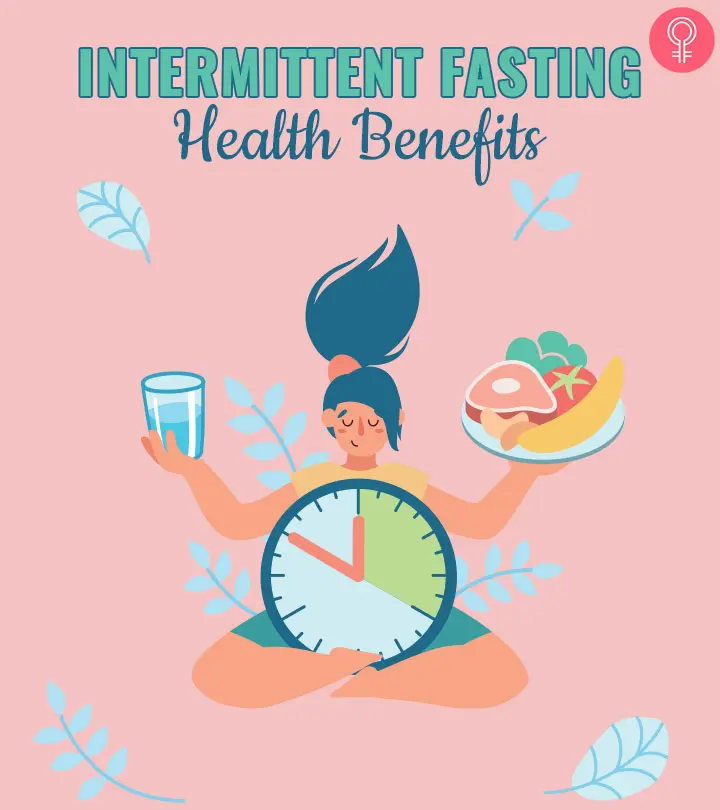
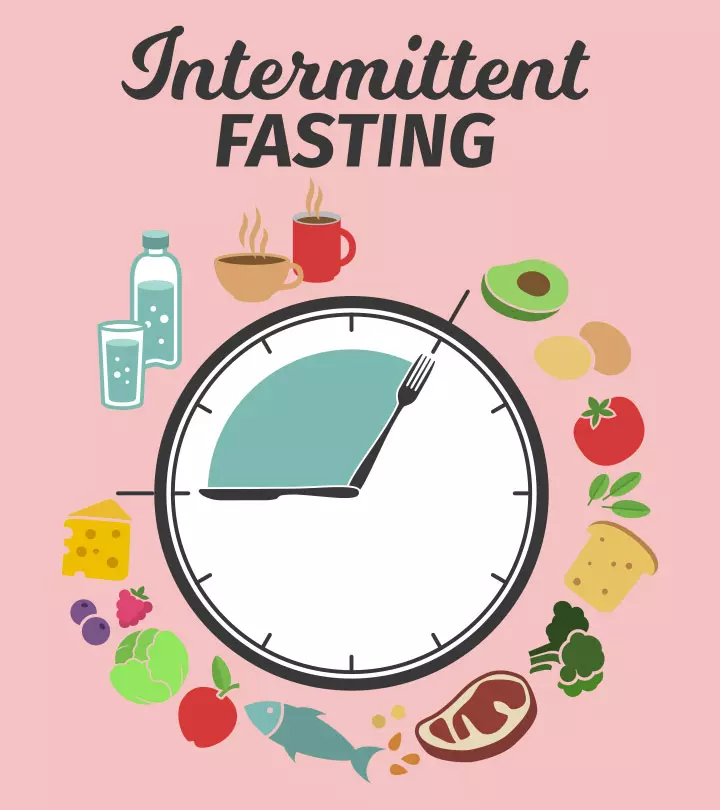

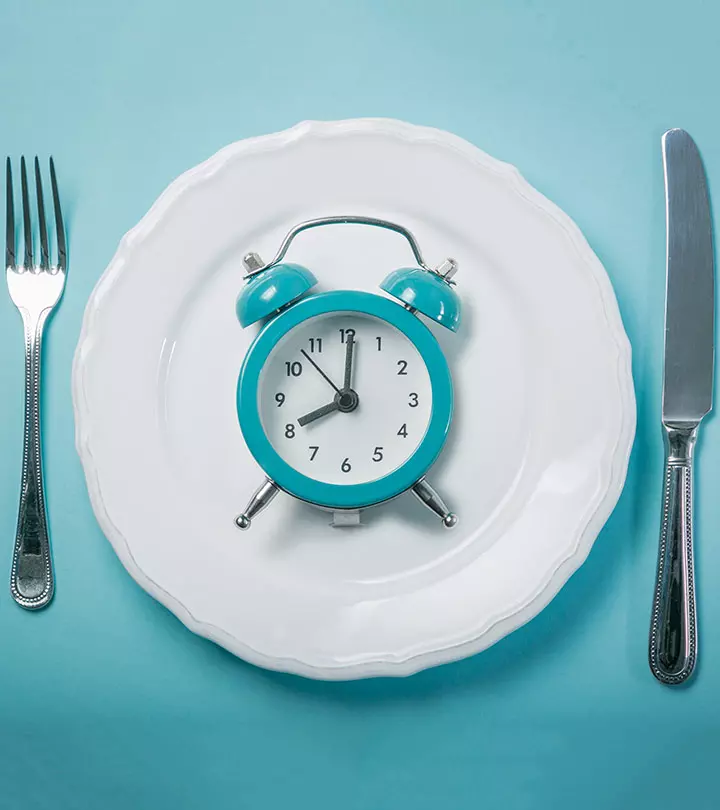





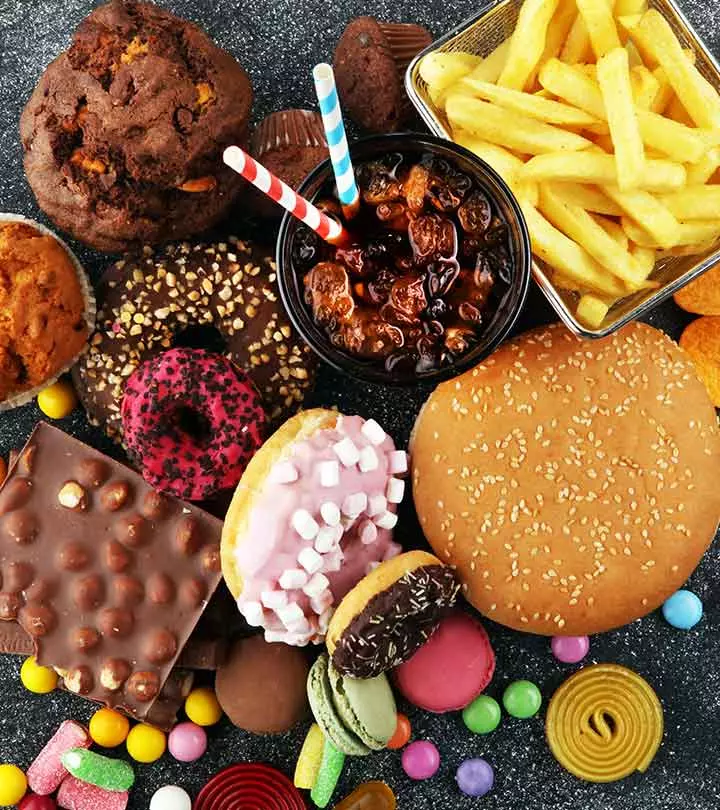


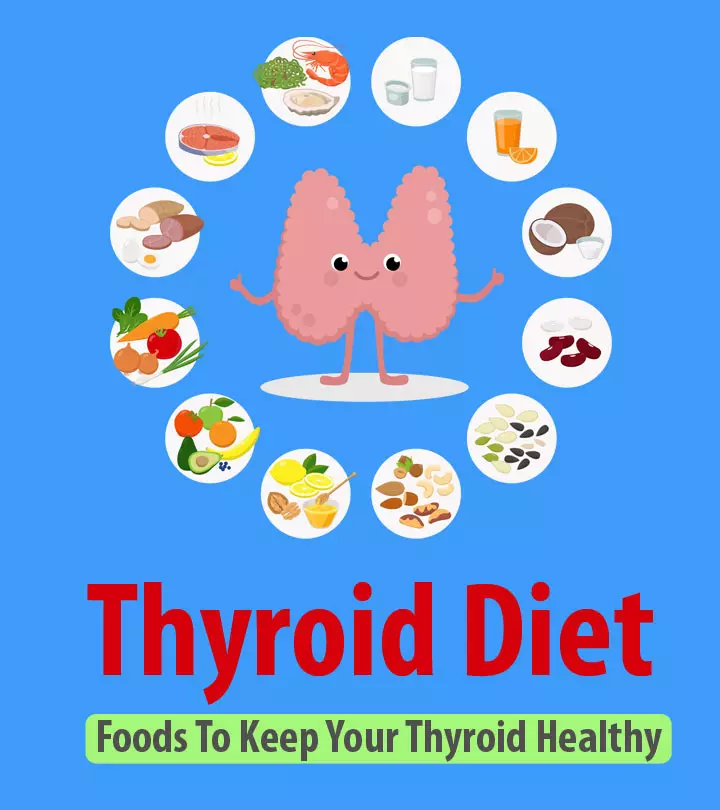








Community Experiences
Join the conversation and become a part of our empowering community! Share your stories, experiences, and insights to connect with other beauty, lifestyle, and health enthusiasts.